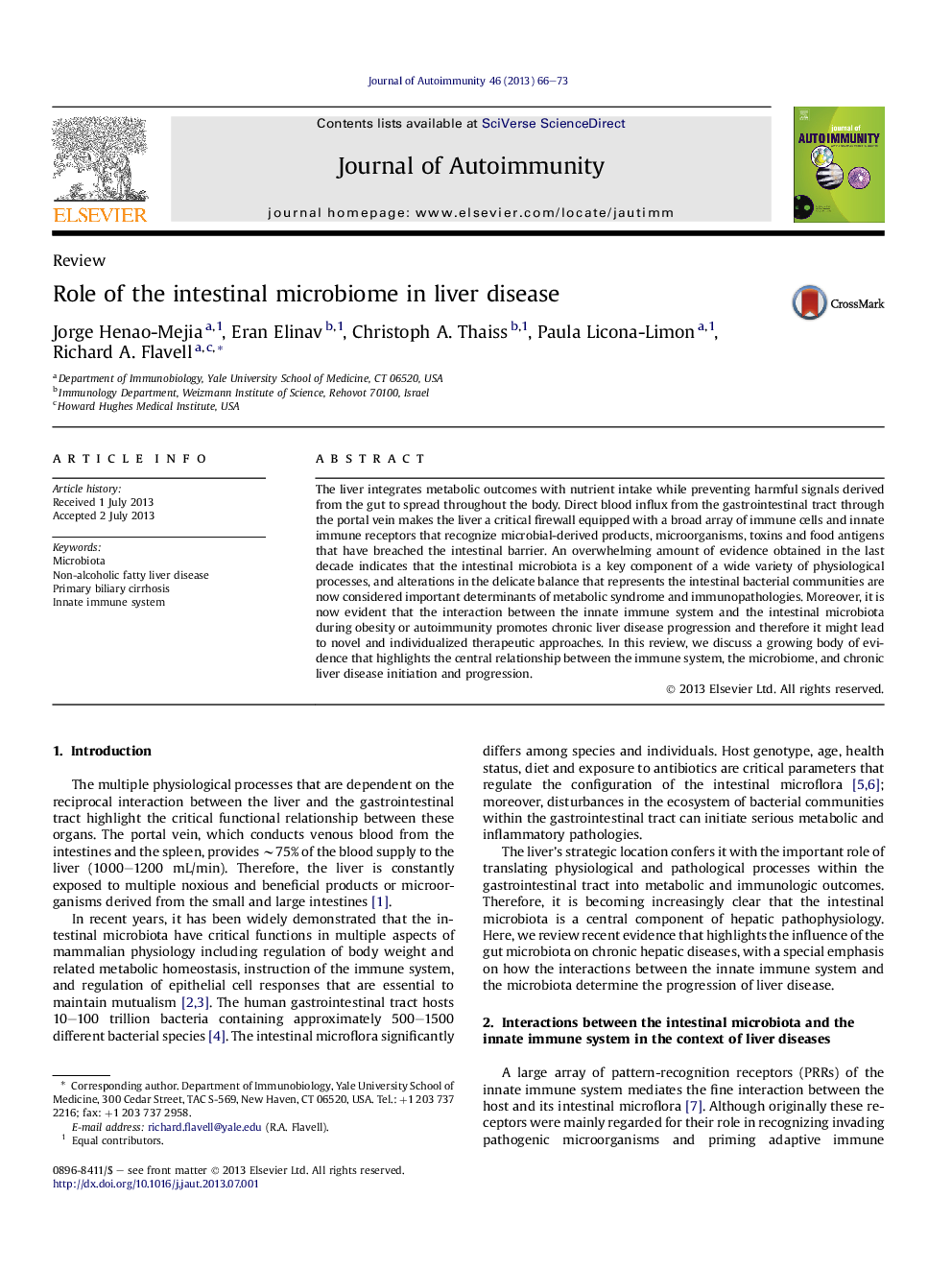| کد مقاله | کد نشریه | سال انتشار | مقاله انگلیسی | نسخه تمام متن |
|---|---|---|---|---|
| 6119307 | 1592302 | 2013 | 8 صفحه PDF | دانلود رایگان |
عنوان انگلیسی مقاله ISI
Role of the intestinal microbiome in liver disease
ترجمه فارسی عنوان
نقش میکروبیوم روده در بیماری کبد
دانلود مقاله + سفارش ترجمه
دانلود مقاله ISI انگلیسی
رایگان برای ایرانیان
کلمات کلیدی
میکروبیوتا، بیماری کبدی چربی غیر الکلی، سیروز اولیه صفراوی، سیستم ایمنی بدن انسان
ترجمه چکیده
کبد نتایج متابولیک را با مصرف مواد مغذی ترکیب می کند در حالیکه جلوگیری از سیگنال های مضر حاصل از روده به منظور گسترش در سراسر بدن است. هجوم مستقیم مستقیم از دستگاه گوارش از طریق ورید پورتال، کورر را یک فایروال حیاتی مجهز به مجموعه گسترده ای از سلول های ایمنی و گیرنده های ایمنی ذاتی که محصولات میکروبی، میکروارگانیسم ها، سموم و آنتی ژن های غذایی را که مانع روده می شوند، شناسایی می کند. مقدار بالای شواهدی که در دهه گذشته به دست آمده، نشان می دهد که میکروبیا روده یک مولفه کلیدی از فرآیندهای مختلف فیزیولوژیکی است و تغییرات در تعادل ظریف که جوامع باکتری روده ای را نشان می دهند، در حال حاضر بعنوان تعیین کننده های مهم در سندرم متابولیک و ایمونوپاتولوژی شناخته می شوند. علاوه بر این، در حال حاضر آشکار است که تعامل بین سیستم ایمنی ذاتی و میکروب بیوتای روده در طول چاقی یا خود ایمنی، پیشرفت بیماری مزمن کبدی را افزایش می دهد و بنابراین ممکن است منجر به رویکرد های روان شناختی و فردی شود. در این بررسی، ما در مورد یک شواهد رو به رشد از شواهد نشان می دهد که رابطه مرکزی بین سیستم ایمنی بدن، میکروبیوم، و شروع و پیشرفت بیماری مزمن کبدی را نشان می دهد.
موضوعات مرتبط
علوم زیستی و بیوفناوری
ایمنی شناسی و میکروب شناسی
ایمونولوژی
چکیده انگلیسی
The liver integrates metabolic outcomes with nutrient intake while preventing harmful signals derived from the gut to spread throughout the body. Direct blood influx from the gastrointestinal tract through the portal vein makes the liver a critical firewall equipped with a broad array of immune cells and innate immune receptors that recognize microbial-derived products, microorganisms, toxins and food antigens that have breached the intestinal barrier. An overwhelming amount of evidence obtained in the last decade indicates that the intestinal microbiota is a key component of a wide variety of physiological processes, and alterations in the delicate balance that represents the intestinal bacterial communities are now considered important determinants of metabolic syndrome and immunopathologies. Moreover, it is now evident that the interaction between the innate immune system and the intestinal microbiota during obesity or autoimmunity promotes chronic liver disease progression and therefore it might lead to novel and individualized therapeutic approaches. In this review, we discuss a growing body of evidence that highlights the central relationship between the immune system, the microbiome, and chronic liver disease initiation and progression.
ناشر
Database: Elsevier - ScienceDirect (ساینس دایرکت)
Journal: Journal of Autoimmunity - Volume 46, October 2013, Pages 66-73
Journal: Journal of Autoimmunity - Volume 46, October 2013, Pages 66-73
نویسندگان
Jorge Henao-Mejia, Eran Elinav, Christoph A. Thaiss, Paula Licona-Limon, Richard A. Flavell,
